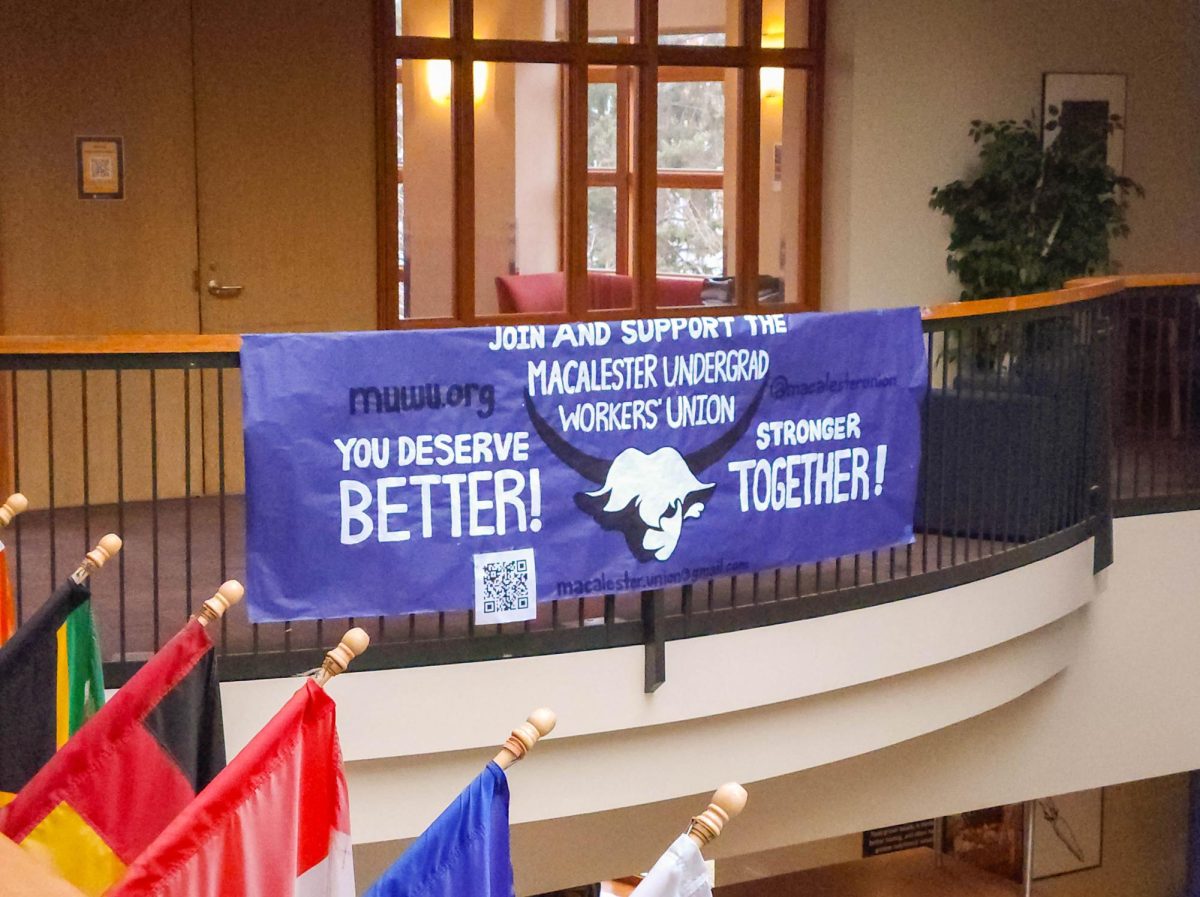Macalester students woke up to a changed campus this past Wednesday, Feb. 7. Banners, posters and chalk messages advertising union efforts had popped up all around school overnight. These messages were not as spontaneous as they seem: they come after 15 months of secretly organizing a student union.
Macalester’s students have never been unionized, but the Macalester Undergraduate Workers’ Union (MUWU) is pushing to change that.
“All issues are union issues,” MUWU organizer Joseph Polyak ’26 said, and MUWU wants to bargain on everyone’s behalf.
MUWU has identified several challenges facing student workers across campus, including problems with management, training, scheduling and pay. Students can attempt to solve these on an individual level, but MUWU organizers say that, without a large group, it is often hard to make meaningful, lasting change. MUWU believes the support and advocacy a union provides is key to improving working conditions at Macalester.
“Apart, we beg; together, we bargain,” Polyak said.
If the union effort succeeds, MUWU hopes to meet with Macalester administration to create a contract for student workers. The union would then continue to support student employees, including helping them solve workplace issues and protecting the things they value about their jobs.
“Unions don’t just fizzle away; they are legal entities,” Cafe Mac student employee and MUWU organizer Jasper Knabe ’27 said. “It’s good to have legal backing that represents a very concrete ability to solve problems moving into the future.”
This unionization attempt comes less than two weeks after Macalester’s non-student Bon Appetit workers announced their own goal to unionize after five years of organizing. Bon Appetit branches at colleges around the country have been conducting similar union attempts. MUWU’s push also takes place amongst a nationwide resurgence in union strength, with United Auto Workers (UAW), Hollywood writers and Starbucks workers all striking in the past year.
MUWU’s union effort started 15 months ago, when some Cafe Mac student employees attended a Macalester Young Democratic Socialists of America (YDSA) meeting about union organizing. The workers decided they wanted to improve things about their workplace and assembled a small group interested in organizing for student workers’ rights on campus. The first bargaining group only included Cafe Mac student employees.
“Cafe Mac can be a sort of stumbling, tumbling mess at times that would benefit a lot from the things that unions can accomplish,” Knabe said.
Many MUWU organizers and students signing union cards on Wednesday echoed the sentiment that Cafe Mac is one of the most taxing places to work on campus, with its fast-paced atmosphere and long hours.
“It’s supposed to be a job that you’re able to manage with your schooling, and it’s definitely difficult sometimes,” one Cafe Mac worker and MUWU member, who wished to remain anonymous, said. “There’s a lot going on, and it’s hard being there as a student.”
Cafe Mac employees also point to issues with management and a shortage of training that leaves them unaware of food safety laws and the basics about how to do their jobs. This year, Henna Schecter ’26, one of the original MUWU organizers, trained new Cafe Mac employees herself to prevent them from encountering the shortage of knowledge about their role that Schecter contended with on her first day as a Cafe Mac employee. Even still, first-year Cafe Mac workers report being yelled at for not knowing how to do things by managers who didn’t train them. “No one should have to feel that, but especially not at a place where the endowment is [almost 850] million dollars,” Roxy, a Cafe Mac worker and MUWU organizer who requested to be identified only by her first name, said. “We work our asses off for the school, and we get paid minimum wage. That’s not fair.”
After that YDSA meeting, Schecter and other original organizers talked to almost all Cafe Mac student employees about union efforts, and about 60% of them were in support. They met to discuss their plan and made a huge change: instead of sticking with their centralized effort of a Cafe Mac workers’ union, in which they all had a direct stake, they decided to expand the union to every workplace on campus. They realized that the issues they experienced were not unique to Cafe Mac, and concluded that every student worker deserves a union.
“[This decision] was the first time it really felt real or important,” Schecter said. “We decided to make it a bigger fight.” In the 15 months since they started organizing, MUWU has been building enough support to go public. For many months, they learned about the logistics of unionizing and began to put the pieces into place.
The Emergency Workers’ Organizing Committee, a grassroots organizing program that supports workers in their unionization efforts, has been helping MUWU along the way. MUWU is also receiving legal support from a local lawyer.
This preparation all led to Wednesday’s public announcement of the union effort, which has been met mostly with support from students. Some students were confused about the purpose of a union or worried that pay increases from the union efforts would raise tuition, but most wanted to sign a union card.
“I’ve always believed that Macalester students should be paid more at Macalester College, considering the amount of money that students pay for tuition, and I think that this union is a really great thing for Macalester students,” Willow Albano ’26 said.
Albano said that their campus job is comparatively easy and that they signed a card in support of other workers, especially food service workers, who they believe should be paid more for putting in more work. Many other card-signers shared this sentiment.
Further, some believe that student workers should be paid more across the board.
“Even though I love my job, I of course would want to be paid more for the work that I do,” Ryan Cotter ’24, who works at the Lealtad- Suzuki Center for Social Justice (LSC), said. “I think the work we do at the LSC and all the other departments we have on campus is super crucial to keep it running and functioning as it is, [with] spaces created by and for students … and I think we deserve to be compensated better for that work.”
Many students raised the issue of not being scheduled for enough hours, something that especially affects students on work study. Francesca Barroso ’27, who works on campus, couldn’t get enough work hours scheduled and was only able to make half of his work study award. Stressed, Barroso reached out to Financial Aid, which couldn’t offer anything extra except for emergency funds. Barroso didn’t need these, but his family had been expecting the work study money they had been offered. This experience is not unique to Barroso, and it is why he is organizing.
In addition, Ellie Berkenblit ’24 said that she wants more awareness around sick days and mental health days. She explained that her bosses have been understanding about these things, but that is not the case everywhere on campus.
“Having awareness that we are humans and people and just improving how we work, when we work and how people talk about needing time off would be great,” Berkenblit said.
Higher pay, more hours for those who need them, increased understanding and even time off are all issues for which MUWU is considering bargaining.
But that bargaining does not come yet. Right now, MUWU’s goal is to get as many student workers as possible to sign union cards. There are about 1000–1100 student workers on campus, and MUWU wants at least 700–800 of them to sign a card before they feel confident enough to hold an election to officially form the union.
MUWU organizers stress that signing a union card is completely protected under the National Labor Relations Act. According to the National Labor Relations Board, this 1935 law encourages collective bargaining and gives private sector employees “ the fundamental right to seek better working conditions and designation of representation without fear of retaliation,” including through organizing, signing union cards and unionizing. Student workers, including international and undocumented students, are fully protected under this law.
It is true that illegal union busting does happen. However, Schecter said she would be incredibly surprised if Macalester violated the law. In addition, MUWU’s lawyer can ensure legal protection if Macalester threatens anything against the law.
In MUWU’s view, the best-case scenario is that Macalester will sign a neutrality agreement, which would mean that they won’t interfere with the organizing process, and that Macalester will voluntarily recognize the union. Compass Groups, the parent company of Macalester’s Bon Appetit workers, signed a neutrality agreement.
However, according to MUWU organizers, this best-case scenario is unlikely. Rather, they expect that, if they get enough union card signatures, MUWU will send the cards to the National Labor Relations Board (NLRB). If the NLRB agrees that MUWU has reached the threshold of signatures needed, MUWU will hold a secret ballot election on whether to form a union. If more than half of the student workers who turn out to vote cast their ballot in favor of a union, MUWU will become a legally certified entity.
If all of that happens, the newly-established union can begin to bargain for a contract. MUWU hopes that Macalester bargains in good faith if they reach this step. After securing a contract, MUWU plans to keep fighting for Macalester’s student workers into the future.
“We do not have all the answers for how to fix Macalester,” Roxy said. “All we can do is organize to try to make it better.”
Student workers who wish to sign union cards can do so outside the Campus Center from noon–1 p.m. every day for the next couple weeks. Alumni and students who don’t work on campus can show support by signing solidarity petitions. MUWU members welcome anyone who wants to get more involved to join their meetings — where students can also sign cards — every Sunday at 2:30 p.m. on the bottom floor of Old Main.











